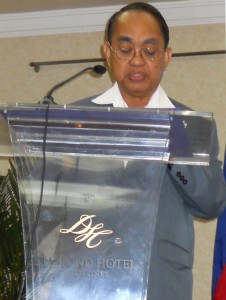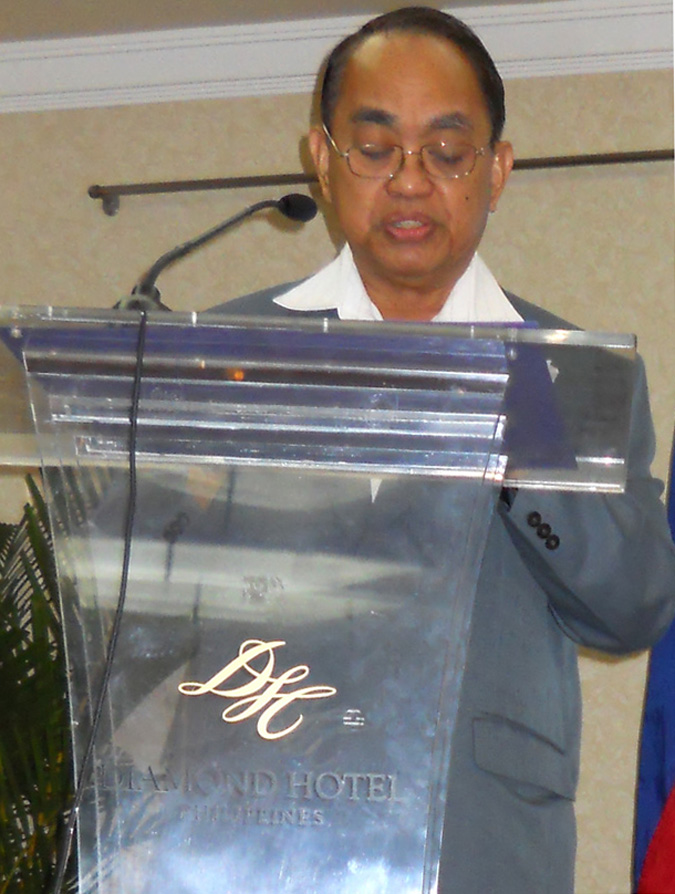
The Philippine maritime industry needs no less than a visionary with strong political will to institute necessary and long-needed changes in the sector.
This is according to former Philippine Interisland Shipping Association (PISA) president Ret. Col. Leonardo Odoño, one of the speakers at last week’s Philippine Maritime Law Annual Conference jointly organized by the Maritime Law Association of the Philippines and PortCalls at the Manila Diamond Hotel.
But as things stand, Odoño said the maritime industry may not even be a priority for new Transportation Secretary Joseph Emilio Abaya whose focus, Odoño said, seems to be on air transport and land linkages.
Now the president of Alabat Shipping Corp, Odoño said Abaya’s very first public statement upon his designation as transport chief “does not inspire hope that our government will finally, if belatedly, wake up to the strategic role that shipping plays in the national development enterprise and put shipping on its development priorities.”
He noted, “A number of issues are holding up the growth of our industry. But to my mind, our government’s inability or unwillingness to recognize the vital role of shipping in national development, is central to the problems of our industry.”
Odoño said, “It appears to me that the government will continue to leave the private sector alone to drive the shipping industry.”
In the more notable maritime countries in the world, he noted, “development of national shipping is driven by enlightened government intervention where public resources are accessed to build ships and necessary policy support is put in place to nurture the industry. In those countries, the state holds shipping as a strategic enterprise.”
At the moment government, Odoño explained, has no policy framework to develop the domestic shipping industry and offer operators very limited incentives and financing.
Local operators are offered tax breaks and holidays for a limited period of time, which Odoño said is not an attractive proposition for refleeting.
Incentives are also offered by way of Republic Act 9295 or the Domestic Shipping Development Act of 2005, including for importing second-hand vessels but only if these comply with the following age limits: 15 years for passenger ships, 10 years for tankers, and five years for sophisticated vessels.
And while local operators prefer to import second-hand vessels over new ones because they are cheaper, they shun programs offered by such government financing institutions as the Development Bank of the Philippines because they require a relatively high capital investment.
To modernize local shipping, Odoño identified steps government and the private sector can take, including:
- Reduce the cost of doing business in the country. Filipino shipowners pay all kinds of taxes;
- Create a single maritime administration to achieve unity of purpose and to insure coherence of policy. The current framework involves many regulatory agencies;
- Reduce bureaucratic burden on shipowners through harmonization of ship inspection and certifications;
- Revise Philippine Merchant Marine Rules and Regulations;
- Computerize applications for registration/certification to minimize human intervention;
- Clear safety management framework;
- Continue imposing cabotage rule in order not to dampen the already low appetite for investment;
- Implement the Maritime Labor Code ratified two months ago; and
- Pass the Philippine Merchant Shipping bill pending in Congress for the last five years.
For fleet modernization, Odoño recommended compulsory retirement of old vessels over a period of time, starting with the phase-out of wooden-hulled vessels that do not conform to standards and unclassed steel-hulled vessels beyond a certain age cap.
Odoño said development of the shipbuilding industry to supply new buildings to replace old ones is also vital, as the second-hand market—the traditional source of suitable small vessels for the domestic trade—is fast drying up.
Government should also restrict importation of second-hand vessels of the type and size which can be built locally to spur demand for newbuildings and to also put in place a “scrap-and-build program” to induce scrapping of obsolete vessels. Under this program, government will acquire vessels ready for scrapping, giving incentives to the shipowner for disposing of his old vessel, on condition that the shipowner orders a replacement newbuilding from a local shipyard.
Finally, Odoño pushed for a shipping industry development plan that will be the blueprint for industry’s growth, guiding decisions of government planners, policy makers and private sector investors alike.
“I don’t know if we had one, ever,” he said.
[copyscape]





